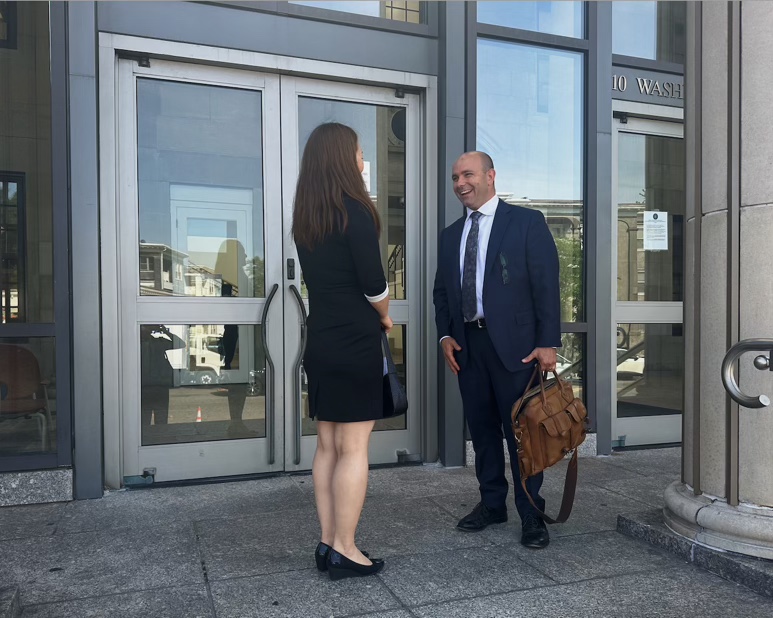Jul 24 2024 17:15
Local Knowledge Turned Legal: The Benefits of Representation Straight from Your Community
By Josie Mastandrea
Josie Mastandrea, a rising junior at the University of Richmond, spent the summer of 2024 shadowing Attorney Chris Fiorentino to develop a better understanding of what the life of a criminal defense lawyer looks like. The following article is one of a series documenting the insights she derived from the experience.
If you’ve ever been searching for an attorney, you’ve probably wondered whether to go to the legal practice down the street or head into downtown Boston to hire from a large, well-known firm. For many, solid legal representation can be the difference between a conviction and an acquittal. To say the quality of your representation is important is a serious understatement. So, the bigger the firm, the more resources, then the better the representation, right? I thought the same, before seeing Chris in action, that is.
Last Tuesday, I’m on my way to the Quincy District Courthouse to watch Chris handle a restraining order hearing when I get a call–the hearing was canceled. Chris suggests that I come down to the courthouse anyway; he’ll show me around.
A short while later, I ease into the courthouse parking lot to see a sign detailing how to pay the parking fee. Luckily, I remember that Chris told me the day before there is always free street parking available if you just drive around the block.
Apparently, similarly frugal court-goers did not receive the same tip. As I walk up to the front doors of the courthouse, having parked comfortably and economically just a block away, an argument commences on the street directly in front of the courthouse. The players? A man attempting to save a spot directly in front of the courthouse and a woman desperate for this very spot. In trying to avert my eyes, I see Chris standing about 10 feet back, watching the scene unfold. As the woman begins to edge uncomfortably close to the man in the street, Chris calls a State Trooper over to intervene.
“Hey man! Take a look at this.”
The State Trooper nods to Chris and approaches the scene. As the Stat e Trooper gets closer to the street, the situation immediately de-escalates. The man steps back onto the sidewalk, and the woman pulls into the spot.
“Will I see you in class on Thursday?” Chris asks the trooper.
“I’m busy this week. I’ll be there the next,” he replies.
Chris tells me they take a Brazilia n jujitsu class together every Thursday. Chris introduces me, they chat for a bit, and into the courthouse we go.
Chris needs to file a motion to continue for one of his clients (not the one who’s hearing was canceled that morning, incidentally). A motion to continue is a formal request to postpone a legal proceeding, often used when a client has a scheduling conflict or a witness is unavailable on the scheduled date. We walk to the clerk’s desk, and Chris begins to fill out a form for the motion. He doesn’t get far before the clerk waves his hand at Chris, as if to say not necessary. He asks Chris what it is he needs, Chris tells him, and the clerk immediately sends us upstairs to discuss the motion with an Assistant District Attorney.

Upstairs we go! Chris and I reach the Assistant District Attorney office, and I peer inside to see exactly who it is we’re looking for. Chris doesn’t do the same–he’s met with this attorney many times before. Chris gives him a quick wave, they chat for a minute, and the attorney tells him moving the hearing should be no problem. We head back downstairs to the clerk’s desk.
Once there, Chris tells the clerk he has the Assistant District Attorney’s approval. The clerk nods. The hearing is successfully rescheduled.
Chris gives a quick call to his client outside the courtroom, who is very pleased with the news, and we head off to grab coffee at the cafe across the street.
This whole ordeal took about 15 minutes and all of zero paperwork.
Had Chris not been a frequent face in the Quincy District Court, what took 15 minutes might have taken a day or two to accomplish. The motion Chris sought to file might have taken hours to process and the coordination of court dates with another busy attorney is typically not an easy task. Chris, however, has been working with the employees at the courthouse for years and so has an easy rapport with the people who can get things done either very slowly or very efficiently.
While his friendly face and confident persona may have an impact, by virtue of Chris having practiced in Quincy and surrounding areas for years, he is able to advantage his clients in ways an outside attorney could not, whatever resources they may have access to. If you want someone who can get the system to work for you, rather than have you work around the system… choose a lawyer from your local community.
